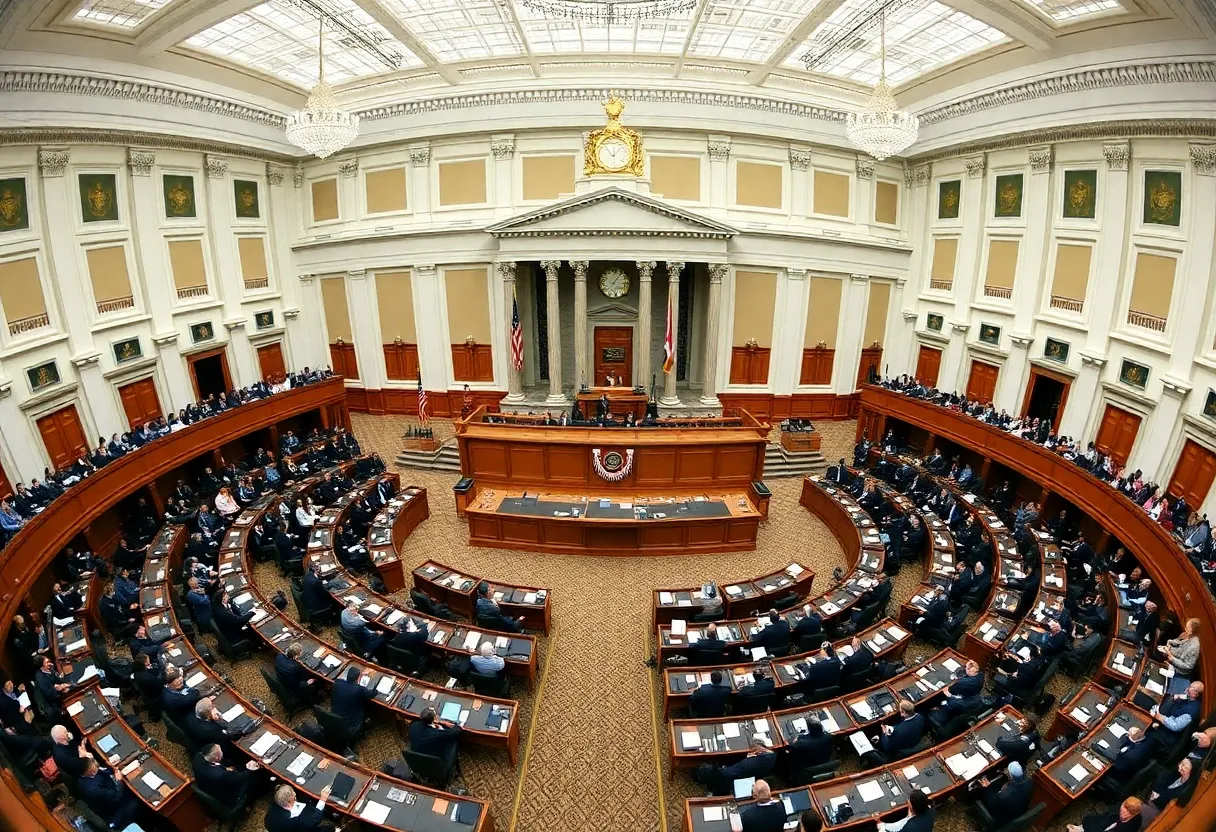News Summary
New York lawmakers are set to vote on a proposed $254 billion budget package, which may surpass $260 billion, marking the largest in the state’s history. Governor Kathy Hochul’s proposal includes $6.2 billion for unemployment insurance debt repayment, amid concerns of transparency and expedited voting processes. Lawmakers are addressing various policy issues, from educational reforms to mental health regulations. The ongoing budget discussions have faced criticism for their lack of openness, raising concerns about effective legislative oversight and public scrutiny as the voting day approaches.
New York state lawmakers are preparing to vote on a proposed $254 billion budget package, as announced by Governor Kathy Hochul. This budget, which is anticipated to surpass $260 billion, is set to be the largest in New York’s history. A significant component of this budget includes an additional $6.2 billion drawn from the state’s reserves, designated specifically for paying off New York’s unemployment insurance debt. Lawmakers are facing pressing concerns regarding the transparency of the budgetary process, as they consider the implications of expediting the vote.
Hochul’s budget proposal marks a pivotal moment, particularly in the context of the anticipated economic downturn that she has flagged. By opting to eliminate the unemployment insurance debt rather than merely servicing its interest, Hochul aims to safeguard businesses and jobs against the backdrop of a looming recession. This strategic pivot also addresses the repercussions of federal tariffs imposed under the Trump administration and seeks to bolster the state’s rainy day fund.
The urgency surrounding the budget is further complicated by the use of a legislative tool known as a “message of necessity.” This measure allows for the bypassing of the usual three-day waiting period for new bills, a move that has attracted criticism from lawmakers across the aisle. Senate Minority Leader Rob Ortt is among those voicing concerns, arguing that such measures impede thorough scrutiny and review of the spending plan, which is especially crucial given its size.
Adding to the controversy, Republican Senator Mark Walczyk has proposed legislation that would abolish the use of messages of necessity for budget bills. He contends that doing so would ensure greater legislative oversight and accountability within the budgetary process. Good-government advocacy groups echo these sentiments, expressing dissatisfaction with the current rush that leaves little time for both lawmakers and the public to examine the budget’s final language.
Amid the negotiations, various policy issues have also emerged. The budget discussions included reforms to the state’s discovery laws aimed at preventing the dismissal of criminal cases due to technicalities. Additionally, revisions to involuntary commitment rules for individuals with mental illnesses were anchored in the negotiations, demonstrating the budget’s multifaceted nature.
In the educational sphere, lawmakers have come to a compromise regarding regulatory changes affecting Yeshivas. This development follows a 2023 investigation alleging that certain Yeshivas fell short of educational standards. The budget plan also allocates $450 million for a new emergency department at Upstate University Hospital in Syracuse, a critical investment intended to tackle ongoing overcrowding issues.
This year’s budget process has experienced delays, extending past the traditional April 1 deadline. As discussions on key policy issues continue, the atmosphere within the legislature has been marked by frustration over the perceived lack of transparency. Several senators have reported facing challenges in accessing detailed information regarding budget contents, an issue that has heightened dissatisfaction with the legislative process.
Overall, the budget negotiation process has been criticized for its lack of openness, with essential discussions happening behind closed doors involving the governor and key legislative leaders. As voting day approaches, the balance between swift legislative action and thorough public scrutiny remains a hotly debated issue among New Yorkers, highlighting the complexities surrounding such a substantial financial proposal.
Deeper Dive: News & Info About This Topic

Author: STAFF HERE NEW YORK WRITER
The NEW YORK STAFF WRITER represents the experienced team at HERENewYork.com, your go-to source for actionable local news and information in New York, the five boroughs, and beyond. Specializing in "news you can use," we cover essential topics like product reviews for personal and business needs, local business directories, politics, real estate trends, neighborhood insights, and state news affecting the area—with deep expertise drawn from years of dedicated reporting and strong community input, including local press releases and business updates. We deliver top reporting on high-value events such as New York Fashion Week, Macy's Thanksgiving Day Parade, and Tribeca Film Festival. Our coverage extends to key organizations like the Greater New York Chamber of Commerce and United Way of New York, plus leading businesses in finance and media that power the local economy such as JPMorgan Chase, Goldman Sachs, and Bloomberg. As part of the broader HERE network, including HEREBuffalo.com, we provide comprehensive, credible insights into New York's dynamic landscape.





